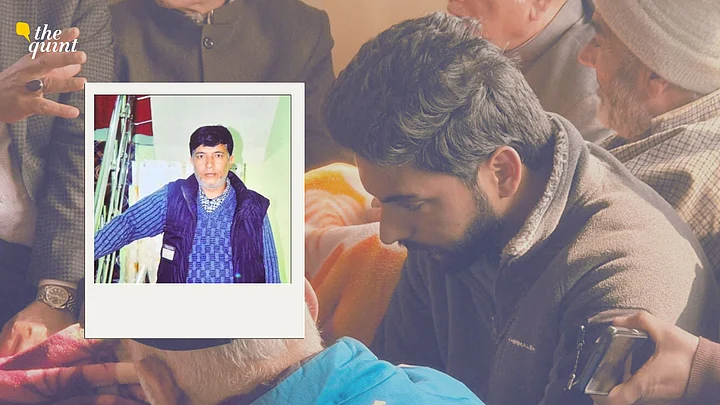It was meant to be an ordinary Friday for 62-year-old tailor Mohammad Shafi Parry of Nowgam, Srinagar. For decades, Shafi had earned his living from a modest tailoring shop in the neighbourhood. On 14 November, he left home at 8:00 am – just like any other day.
At around 10.30 am, his wife, Rafeeqa, walked to the shop with a flask of tea – a daily ritual, since Shafi always left early. But that morning, the shutters were down. “She was shocked,” recalled Shafi’s nephew, Zahoor Ahmad Parry, as he spoke to The Quint at the family’s home in Nowgam. “He never left the shop locked during work hours.”
When a worried Rafeeqa called, Shafi told her he had been “called by the police to stitch something at the station.”
He returned home about an hour before the Friday prayers and told the family he needed to eat quickly, offer namaz, and then return to the police station to finish the work.
Hours later, Shafi was among the civilians killed in an explosion at the Nowgam police station. The blast was triggered by explosive materials recovered from the Faridabad terror module, which had been brought there as part of the investigation.
Rafeeqa now lives with a tormenting question: should she have stopped him from going back?
“We told him not to go. He was already feeling unwell,” said his son, Shahid.
Shafi Spoke to the Family 20 mins before the Blast
Survive by his wife Rafeeqa, daughter Rabia (25), and Shahid (19), Shafi was the sole breadwinner of the family.
Zahoor said that Shafi had called the family at around 11 pm, informing them that the work would “take some more time.” They urged him not to return alone so late and to ask the police to drop him back.
“He told us, ‘Okay, you sleep. Don’t worry. I will tell them,’” Zahoor recalled.
That was their last conversation.
At 11.22 pm, the family heard the massive blast that rocked the police station and several buildings around it. Nine people were killed and 27 police personnel were injured.
Neighbour Junaid Ahmed told The Quint that windows in dozens of houses shattered and “there was fire all around.” Several residents said they saw “body parts, like ears, flying into lawns.”
Zahoor, along with Shafi’s sons, rushed to the site but found only “fire and smoke.”
They began a frantic search across hospitals. “We went to Ujala Hospital — he wasn’t there. Then to Ahmed Hospital, then two or three more places,” Zahoor said. “At SMHS also, we couldn’t find him. It felt like a horrifying hunt.”
From SMHS, they were directed to BB Cantt Army Hospital, and then to the Police Control Room (PCR), where they waited through the night.
Early the next morning, the PCR informed them that a body had been identified. “They said they found a bill – an invoice with his name on it,” Zahoor said. “They told us no one else had been identified yet.”
“When I went inside the mortuary, I saw my uncle,” he said quietly.
According to the police, a large quantity of explosives recovered from Faridabad on 9 and 10 November had been stored in the open yard of Nowgam Police Station “as per prescribed procedure” for sampling by the Forensic Science Laboratory (FSL). Police said the explosive materials were unstable and, despite “extreme caution,” detonated during the sampling process on 14 November.
